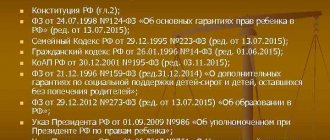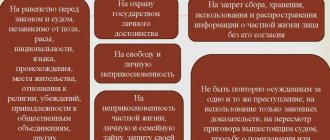Realization of the right of minors to their own property in the main regulations of the Russian Federation
Russian legislation protects the interests of its citizens. It did not ignore minor children either. The property rights of the child are provided, first of all, by the Family Code, as well as the Civil Code of the Russian Federation.
The child’s right to education, to protection, to freely express his opinion, etc. The above-mentioned sets of laws implement the property rights of the child.
The property rights of a child as a citizen of the Russian Federation are provided for in the Constitution of the Russian Federation. Article 35 of this code of laws talks about the right of every private person to private property. An entity that owns personal property can dispose of it according to its needs and wishes. Deprivation of property occurs solely by court decision, and the right to personal property itself is protected by law.
Taking the article of the Constitution as a basis, Russian legislation guarantees the realization of the right to property rights of a child (including orphans, disabled children, children with disabilities). We are talking about the relevant provisions of the Civil and Family Codes. These, in particular, are:
- Article 60 of the Civil Code of the Russian Federation;
- Articles 80, 93, 94 of the Civil Code of the Russian Federation;
- Articles 26 and 28 of the Civil Code of the Russian Federation;
- Article 37 of the Civil Code of the Russian Federation;
- Articles 2 and 7 of the Law of the Russian Federation “On the privatization of housing stock in the Russian Federation”;
- Article 59 of the Family Code of the Russian Federation.
Also, the property rights of the child are mentioned in other regulations.
Consequences of owning a child as a thing
When it comes to children, you should always remember that if you neglect to respect them, the mother makes a double mistake. Firstly, the child does not yet have sufficient knowledge to recognize all the games that she imposes on him. Secondly, he is completely dependent on her care and help. Therefore, by “exceeding her authority,” she will subsequently create big problems for both herself and her child. Let's consider what the child-thing turns into.
A person with a constant feeling of guilt If you meet such a person, you will be amazed at his serious attitude towards life and his demands on himself. His shoulders are hunched, his head is half-lowered. Such a person practically does not smile; he constantly delves into himself and reflects on his unworthiness. All this is the result of the fact that, starting from childhood, his mother was constantly indignant about why she gave birth to him. She never minced words and blamed her son or daughter for any problem in her life. The worst thing is that such zombification is almost impossible to remove, since such children see the meaning of their lives in suffering.
Photo: child as a thing
- A child is henpecked
Even as an adult, such a person completely lives in the interests of his mother. In his own family, his mother is also dominant. All decisions are made only with her approval, from the color of the kitchen towels to the choice of a bride for her grandson. Such a mother almost completely succeeded in suppressing the development of her child’s personality. - A child is a nanny
For each of us it is painful and offensive to hear when our mothers tell us “I carried you, gave birth to you, raised you...., and you...”. Each of us does not like these conversations, because on the one hand, we did not ask to be given life, it was the decision of our parents. On the other hand, we feel guilty for not being perfect children. When a child is given life only to have it “taken away”, we all feel some kind of hypocrisy. We just want to be loved and not used in our old age, because we must repay our debt, even if it threatens the destruction of our own family and the loss of loved ones.
Child's right to education
The right of a citizen to receive a quality education is guaranteed, first of all, by Article 43 of the Constitution of the Russian Federation. This article examines the general availability of free education in preschool, general education and secondary vocational educational institutions. Every citizen is obliged to receive basic general education.
Article 29 of the Convention on the Rights of the Child also addresses the child's right to free education. The upbringing and education of children should be aimed at the formation of a comprehensively developed personality, the development of moral, aesthetic, mental and physical qualities, as well as the preparation of a minor for conscious life. Children of all categories (including orphans, disabled children and children with disabilities) have the right to education.
Adopted in 1992 (edited in 2004), the Law of the Russian Federation “On Education” considers the right to education of all citizens of the Russian Federation, regardless of gender, race, nationality, native language, age and health status. Thus, the right to education is guaranteed to everyone - both healthy individuals and disabled people. Moreover, the state is obliged to create all conditions for citizens with disabilities to receive education and upbringing that correspond to their physical and mental capabilities.
Article 18 of the Law “On Education” considers preschool education as the initial type of child upbringing. As a rule, it is carried out in preschool institutions and is free for different segments of the population and categories of children (orphans, disabled children, etc.).
The Law “On Education” guarantees that children receive education, from preschool (Article 18) to higher vocational education (Article 24). Parents (or guardians) have the right to choose the form of upbringing and education for the child (taking into account his opinion) until he receives basic general education. Parents are also obliged to provide their children with conditions for optimal education.
In addition, the child’s right to receive education is also considered in the Family Code of the Russian Federation. It is Article 63 that places responsibility for the upbringing and education of children on their parents, or persons who replace them.
And finally, paragraph 1 of Article 9 of the Law of the Russian Federation “On Basic Guarantees of the Rights of the Child in the Russian Federation” prohibits infringement of the right to preschool, general and educational education.
In case of violations of children's rights, the law provides for administrative/criminal liability.
Responsibility for violation
If parents do not take care of the child, then administrative responsibility arises. In accordance with Article 5.35 of the Administrative Code, they face a warning or a fine of 100-500 rubles. If parents hide the location of their children against their will, the fine will be from 2-3 thousand rubles, and in case of repeated violation - from 4 to 5 thousand rubles or administrative arrest for up to five days.
There is also criminal liability for violations of the legal rights of children. If they are involved as accomplices in committing a criminal offense, then the perpetrators will face imprisonment for a term of up to 5-6 years. Involvement in the use of alcoholic beverages, drugs, and vagrancy can lead to a sentence of up to 4-5 years.
There is also responsibility for failure to fulfill the responsibilities of raising children. In this case, a sentence of up to three years in prison is threatened. Prison sentences and fines are also provided for those fathers who systematically evade paying child support.
A child acquires rights from birth. For example, he has the legal right to live with his parents, receive upbringing, education, medical care, express his opinion and be the owner of property. Over time, the range of opportunities to use one’s legal rights expands, but certain obligations also arise, like any capable citizen of the state.
Sources
- https://FamAdviser.ru/polnomochija/juvenalnaja/semejnyj-kodeks-prava-rebenka.html
- https://dom-i-zakon.ru/semejnoe-pravo/prava-i-obyazannosti-detej.html
- https://sem-kodeks.ru/razdel-iv/glava-11/
- https://journal.tinkoff.ru/prava/prava-deti/
- https://zakonguru.com/semejnoje/rebenka/kodeks.html
- https://ru.wikisource.org/wiki/%D0%A1%D0%B5%D0%BC%D0%B5%D0%B9%D0%BD%D1%8B%D0%B9_%D0%BA%D0 %BE%D0%B4%D0%B5%D0%BA%D1%81_%D0%A0%D0%A4/%D0%93%D0%BB%D0%B0%D0%B2%D0%B0_11
Children's right to maintenance
Legislative acts of the Russian Federation guarantee the right of children to be supported by their parents or guardians. Parents (persons replacing them) can freely choose the form and order of child support. Both spouses must support the minor, regardless of their status and financial capabilities. If parents do not provide adequate support for their children, they are required to collect funds from them to support the child - alimony.
These postulates are set out in Articles 80-86 of the Family Code of the Russian Federation.
Also, in the absence of parents, the maintenance of young children is entrusted to the closest relatives. Grandparents are required to take care of grandchildren under the age of eighteen (Article 94 of the Family Code of the Russian Federation). Adult brothers/sisters are subject to the same obligations in relation to their minor and incapacitated brothers or sisters. In such cases, the above-mentioned persons should formalize guardianship over dependent persons (Article 93 of the Family Code of the Russian Federation).
If there are disabled children in the family, the parents or persons replacing them, along with the maintenance of their wards, are obliged to ensure that they are provided with appropriate conditions for development, upbringing and education (Article 86 of the Family Code of the Russian Federation).
Children who are left orphans also have the right to receive child support from their guardians. This right is guaranteed by Article 148 of the RF IC. In case of violation of the rights of orphans, guardians are held administratively liable.
Need help from a child rights lawyer?
Sign up for a consultation with the practice manager!
+7
The child’s right to carry out small household transactions
The Convention on the Rights of the Child presupposes the right of a minor to carry out minor household transactions. This area, in particular, includes:
- Free disposal of your own earnings and other income;
- Use the copyright of works of science and art;
- Make gifts and make other gratuitous contributions;
- Freely dispose of pocket funds provided by parents or persons replacing them;
- In case of disability - manage the pension allocated by the state;
- In case of orphanhood - manage the pension in connection with the loss of breadwinners;
- Exchange personal items;
- Make bank deposits and manage invested funds.
Minors from 14 to 18 years of age can make such small transactions. If necessary, children can make larger transactions only with the consent of their parents/guardians. A child from 6 to 14 years old can freely manage pocket money, make decisions on small gratuitous transactions (for example, giving gifts) and small household transactions (make small purchases).
Commentary on Article 60 of the RF IC
1. The commented article is devoted to the property rights of the child, regulated by family law. It should be borne in mind that in addition to family law, these rights are also regulated by civil and housing legislation.
The property rights of a child established by family law can be divided into the right to receive maintenance from his parents and other family members, the right of ownership of income received by him, and the right to property acquired with the child’s funds.
Paragraph 1 of the commented article 60 of the RF IC talks about such a property right of a child as the right to receive maintenance from his parents and other family members. In this case, maintenance means the satisfaction of such vital needs of the child as food, clothing, housing, etc.
Typically, such maintenance is provided by parents from their earnings (other income) not as a legal, but as a moral obligation. However, in case of failure to fulfill this obligation voluntarily, such maintenance is collected in court (in the absence of an agreement on the payment of alimony) from the parent obligated to pay alimony, and if the child is unable to receive maintenance from his parents - from other family members (adult brothers, sisters, grandmothers, grandfathers).
The issues of providing maintenance to children by parents and other family members will be discussed in more detail below (see commentary to Section V).
2. There may be situations when a child, living with one or two parents, has the right to receive additional amounts of money. Money for minors can come in the form of pensions, alimony or benefits. Thus, a minor may be assigned a disability pension (Articles 5, 8 of the Federal Law on Labor Pensions in the Russian Federation), a labor pension in the event of the loss of a breadwinner (Clause 3, Article 8, Clause 4, Article 10, Article 13 of the Federal Law of December 15, 2001 N 166-FZ “On state pension provision in the Russian Federation”, Article 9 of the Federal Law “On Labor Pensions in the Russian Federation”), social pension in case of loss of a breadwinner (clause 1 of Article 11 of the Federal Law “On State Pension Provision in the Russian Federation”).
Since children themselves cannot manage the funds received as alimony, pensions, benefits for them, these funds are managed by their legal representatives - parents, guardians and adoptive parents. These funds must be spent on the maintenance, upbringing and education of the child. Thus, alimony is earmarked money that should be used to support the child, therefore any alimony agreements that have in mind the personal interests of the spouses are invalid.
In some cases, one of the spouses (former spouses), paying alimony for the maintenance of their minor children, is not sure that the funds are spent for their intended purpose. In such cases, paragraph 2 of the commented article makes it possible to apply to the court with a request to credit part of the alimony (no more than 50%) to accounts opened in the name of the child in the bank.
3. Children's property rights may arise as a result of the conclusion of a gift agreement, in the order of inheritance. In addition, he can receive different types of income (from work, in the form of scholarships, interest on deposits, dividends on deposits, various types of benefits, etc.). All this property is the property of the child. However, he can exercise this right subject to the rules on legal capacity.
Speaking about the possibility of minors exercising property rights, it should be borne in mind that civil legislation allows for cases where minor children are recognized as fully capable. We are talking, in particular, about an adult marrying before reaching 18 years of age, as well as declaring a minor who has reached 16 years of age to be fully capable (emancipation) if he works under an employment contract, including a contract, or with the consent of his parents, adoptive parents or trustee is engaged in entrepreneurial activities.
The child’s right to dispose of property owned by him is determined by Art. 26 and 28 of the Civil Code of the Russian Federation. In accordance with these articles, minors aged 14 to 18 years make transactions with the written consent of their parents, adoptive parents or trustees. Such transactions are also valid upon their subsequent written approval by the specified persons. The exception is the right to dispose of one’s earnings, stipends and other income, to make deposits in credit institutions and manage them, and to carry out small household transactions.
As for children under 14 years of age, as a general rule they cannot dispose of property that belongs to them. Transactions are made for them by their parents, guardians, and adoptive parents. The exception is small household transactions aimed at obtaining benefits free of charge and not requiring notarization or state registration.
In paragraph 3 of the commented article, reference is made to Art. 37 of the Civil Code, which regulates transactions in relation to the property of minors by their legal representatives. When parents exercise powers to manage the child’s property, they are subject to the rules established by civil legislation regarding the disposal of the ward’s property, and in particular by this article.
According to this article, the income of a ward of a citizen, including income due to him from the management of his property, with the exception of income that the ward has the right to dispose of independently, is spent by the guardian or trustee exclusively in the interests of the ward and with the prior permission of the guardianship and trusteeship authority. Without the prior permission of the guardianship and trusteeship authority, the guardian or trustee has the right to make expenses necessary for the maintenance of the ward from the amounts due to the ward as his income. The guardian does not have the right, without the prior permission of the guardianship and trusteeship body, to carry out, and the trustee - to give consent to, transactions involving the alienation, including the exchange or donation of the ward's property, leasing it, for free use or as a pledge, transactions entailing renunciation of the rights belonging to the ward, division of his property or allocation of shares from it, as well as any other transactions entailing a decrease in the property of the ward.
The guardian, trustee, their spouses and close relatives do not have the right to enter into transactions with the ward, with the exception of the transfer of property to the ward as a gift or for free use, as well as to represent the ward when concluding transactions or conducting legal cases between the ward and the spouse of the guardian or trustee and their relatives relatives.
4. The Investigative Committee established the principle of separation of property between parents and children. Thus, as a result of the joint residence of parents and children, joint property does not automatically arise (as is the case between spouses). However, common property (both joint and shared) between parents and children may arise, for example, as a result of joint acquisition of an item, inheritance, etc. Joint property between parents and children can also arise as a result of the fact that parents and children are members of the same peasant (farm) holding. In addition, we can talk about those cases where residential premises were privatized in the early 90s not into common shared ownership, but into joint ownership.
5. All powers of ownership, use and disposal are exercised by the owners by mutual agreement, and when common shared ownership arises, each of the owners has the right of first refusal.
The essence of this right is as follows. The disposal of common shared property is carried out with the consent of all its participants. Moreover, each participant in common shared ownership can also dispose of his share and the consent of other co-owners is not required for this. However, when selling a share to an outsider, other participants have the right of first refusal, which consists in the fact that they have a preemptive right to purchase the share at the price for which it is sold and on other equal conditions, with the exception of cases of sale at public auction. The seller of a share must notify the other co-owners in writing of his intention to sell it to a third party. For the sale of a share of real estate, the notice period is 30 days, and for movable property - 10 days. After the expiration of the specified periods and if the co-owners have not expressed their intention to purchase the share, the seller has the right to sell it to a third party.
If the share was sold in violation of the pre-emptive right (for example, the seller did not notify the other co-owners about the sale of the share, or did not wait for the waiting period to expire, or sold the share to an outsider on other more favorable terms than those offered to the co-owners), then any other a participant in common ownership may, within three months, legally demand the transfer of the rights and obligations of the buyer to him.
The right of minors to manage their income
The Convention on the Rights of the Child provides for the right of minors to freely dispose of their income.
Also, as stated in paragraph 2 of Article 26 of the Civil Code of the Russian Federation, a minor who has reached the age of 14 has the right to freely dispose of his scholarship, earnings and other own funds. Other income, in particular, may include:
- Cash prizes and gifts;
- Amounts of winnings from competitions and lotteries;
- One-time incentive prizes;
- Income from business activities;
- Income from rental housing owned by a minor.
The right to work of a person under the age of majority is implemented by Article 63 of the Labor Code of the Russian Federation. If a child is hired, an employment contract must be concluded. In this case, a teenager who has reached the age of 16 can enter into an agreement independently. If a 14-year-old teenager is forced to work, the employment contract must be concluded on his behalf by his parents or guardians.
Division of common property of citizens
If citizens decide to dissolve their marriage, then when dividing property they must be guided by current legislation. In accordance with the provisions of the law, spouses have the right to agree on the division of property voluntarily, by drawing up and notarizing an agreement at a notary office, or forcefully - through the court, by filing an appropriate statement of claim. In this case, property can be divided between the spouses either evenly or not - depending on with whom the child will live after the breakup of the family union, as well as a number of other circumstances. In this case, the interested party will have to make efforts to prove the need for a larger share.
If we talk about the property of the children of spouses dissolving the marriage, then, in accordance with Art. 38 RF IC:
- Things that were purchased to meet the needs of children under the age of majority (shoes, clothing, sports equipment, school supplies, books, instruments for music lessons, etc.) in the event of a parental divorce cannot be divided between them, but must be transferred to of these, with whom the child will live. In this case, it does not matter whether the parents bought the property jointly or not.
- The contributions that the parents made at the expense of the common property in the name of their joint children belong to the child and are not subject to division between the spouses in the event of a break in the marriage, regardless of the amount.
If we talk about property that a child owns jointly with his parents, then in the event of the termination of a marriage, citizens are obliged to exclude and not take into account when dividing the part belonging to the child (children), since they do not have the right to divide it.
If the property belongs only to the spouses, then the child will not be able to claim it (only by inheritance, or if the parents, on their own initiative, decide to allocate some share to him).
If parents, despite the requirements of the law, have committed a violation of the child’s rights, the child can appeal to a judicial authority or to the Public Prosecution Service. In addition, employees of the prosecutor's office, as well as other bodies and organizations vested with appropriate powers, can act in the interests of minors.
Transactions made by guardians (parents) only with the consent of the guardianship authorities
The scope of competence of the guardianship and trusteeship authorities includes control over the actions of parents/guardians regarding the property rights of minors. There are a number of transactions, the conclusion of which is impossible without the approval of the above-mentioned bodies (Articles 53 of the Civil and 121 of the Family Codes of the Russian Federation. These, in particular, include the following activities:
- The act of purchase and sale of real estate, the co-owner of which is a child;
- Changing the child’s living conditions;
- Signing a deed of gift for real estate owned by a minor;
- Pledge of real estate – child’s property;
- Leasing or leasing, or providing gratuitous use of housing owned by a minor;
- Exchange and division of property of a minor;
- Refusal of inheritance belonging to a minor;
- Allocation of a share from the property belonging to the child;
- Transactions of purchase and sale of property belonging to an orphan child;
- Transactions of purchase and sale of real estate, the co-owner of which is a disabled child or a child with disabilities;
- Other transactions that are fraught with a decrease in the property of a minor.
All of the above operations are provided for in the articles of the Family and Civil Codes of the Russian Federation. Violation of the procedure for obtaining permission from the guardianship and trusteeship authorities or ignoring the opinion of these authorities on the part of parents/guardians entails legal proceedings in order to limit the rights of parents in relation to the child’s property.
Clarification of legislation
The prosecutor of the department for supervision of the investigation, Alexander Kuprikov, answers: In accordance with Art. 158 of the Criminal Code of the Russian Federation, theft is understood as the commission for mercenary purposes of the unlawful gratuitous seizure and (or) circulation of someone else’s property in favor of the perpetrator or other persons, causing damage to the owner or other holder of this property.
If an item is found on premises or on a vehicle, it must be handed over to the person representing the owner of this premises or vehicle. In this case, the person to whom the find is handed over acquires the rights and bears the responsibilities of the person who found the thing. It would be useful to obtain a receipt confirming that the owner of the premises or vehicle has accepted the found item.
Common property of parents and children
Paragraph 7 of Article 60 of the Family Code of the Russian Federation provides for the concept of common property of parents and children. It means property to which both spouses and children have rights (material and housing benefits). The common property of parents and children can be shared or joint.
According to Articles 2 and 7 of the Law of the Russian Federation “On the privatization of housing stock in the Russian Federation,” joint ownership arises as a result of privatization without indicating the shares of the owners. In the case of shared ownership, in the process of property privatization, equal shares belonging to the co-owners are indicated.
Children can own common property, regardless of their social status or psycho-physical capabilities (orphans, disabled children, children with disabilities, etc.).
Whose thing
If the invoice was issued to one person, he was also indicated by the recipient (delivery was to his address), and another person paid the invoice in full (from his own bank account), then who owns the purchased item? Whose side will the court take? Explanation - the one to whom the invoice and delivery were, does not give these things to the one who paid, citing the fact that the invoice and delivery were in his name, and the fact that someone else paid - this, like, does not count.
Hello, Anna Borisovna. I believe that in the described situation, a person who transferred funds as payment for things purchased by another person has the right to demand from the latter the return of the transferred funds, which can be considered as unjust enrichment.
Violation of the property rights of a minor
Unlike the Convention on the Rights of Children, the Family Code of the Russian Federation provides for the property rights of minor children and sanctions in case of their violation.
Article 60 of the RF IC explains the following: a child is an independent subject endowed with rights to his own property. Parents or persons who replace them have no right to the child’s property. But they are obliged to represent the interests of the child when concluding transactions. Spouses also have the authority to manage the property of a minor.
In the event of a violation of a child’s property rights, intervention by the guardianship and trusteeship authorities is provided in order to control the actions of the violators. In the event that the situation is not resolved peacefully, the property relations of the child and the violators are considered in court.
Take someone else's lost item, knowing whose it is
I would call it theft. Let’s say you’re walking and walking, and there’s a person in front of you. And 5 thousand falls out of his pocket, you see it, pick it up and keep it for yourself. It seems to me that this is the same as theft. Because imagine, that person will come home, wants to take his 5 thousand, but they don’t exist. Maybe for him it’s a lot of money, and the person stupidly thinks he stole it. But. there is an expression “What falls is lost,” that is, what a person has lost no longer belongs to him, but I don’t agree with this. Although I had such a situation as a child. In a store, a man lost 10 rubles, I I saw this and wanted to pick them up when he left and keep them for myself. I waited and waited. But in the end he saw that his money had fallen. I remember that I was upset then. Now I remember this and think that I was stupid and too small even then.
Yes. And everyone understands this. But if someone says the opposite, then he calms himself down, saying that I didn’t steal, but only picked up what was lying badly. The very fact that you know whose it is legally puts you in the position of intentional theft. So let everyone draw their own conclusions. Whether he wants to have a clear conscience or not.
Judicial protection of property and non-property rights of children
The second article of the Constitution of the Russian Federation states the duty of the state to recognize, respect and protect human rights. Judicial protection of a citizen is guaranteed by Article 118 of the Constitution. The Family Code of the Russian Federation provides for the protection of children's rights in court. Such cases include:
- Collection of alimony from parents/guardians in the event of the latter’s refusal to support the child;
- Legal proceedings related to violation of the property rights of minors and changes in living conditions;
- Litigation regarding violations of the rights of orphans and adopted children;
- Court hearings due to violations of the rights of disabled children and children with disabilities;
- Violation of the non-property rights of minors (the right to education, change of surname and first name, to communicate with both parents in the event of divorce, etc.).
In all of these cases, the representation of the child falls within the competence of the guardianship and trusteeship authorities.
Author of the article
Voluntarily or through court
Divorce proceedings accompanied by the division of marital property are always painful and require patience, time and financial expenses for a lawyer.
Each couple decides for themselves how far they can go in dividing property and whether it is worth going to court or can be resolved at the negotiating table. The law contains rules both in the case of judicial division of property and in the case of a peaceful settlement of the dispute.
Ex-spouses can divide property as follows:
- conclude an agreement on the division of property and specify in it who is to transfer what property; such an agreement is certified by a notary.
- file a claim in court for the division of jointly acquired property and determination of shares in this property.
- before the divorce, enter into a prenuptial agreement.
No court makes people closer and happier, but it can help quickly, effectively and fairly defend property rights. The main condition here is to correctly state and substantiate claims and build tactics in court. In case of an error a second time, it will no longer be possible to go to court; the decision taken and entered into force will be final.
By mutual agreement
Spouses can divide common property by written agreement, without necessarily bringing the matter to court. Such an agreement must be certified by a notary. In practice, notaries themselves prepare an agreement on the division of property; the spouses only need to reach agreement and explain to the notary how the property will be divided. To ensure that your rights are not violated by the separation agreement, contact a practicing lawyer before signing such an agreement. This way you will be sure that you will receive a fair share of the jointly acquired property.
Judicially
In the event of a dispute about who is entitled to what part of the property and what is considered jointly acquired property and what is personal, the division of property is carried out in court.
To do this, you need to collect documents on the property, prepare a statement of claim and go to court. More information about how to go to court is written below in the next section.
When dividing the common property of the spouses, the court determines what property is to be transferred to each of the spouses, in what shares the property should be divided - in equal shares or to deviate from the equality of shares and transfer more than half of the property to one of the spouses. In the event that one of the spouses is transferred property whose value exceeds his/her share, the other spouse is awarded monetary compensation.
Often, even before the official divorce, spouses actually separate and do not maintain relations. If during this period any of the spouses acquires property, the court may recognize such property as personal property and refuse to divide it.
Is a prenuptial agreement a reason for mistrust?
Not really
Through a marriage contract
During marriage, spouses can enter into a prenuptial agreement. In this agreement, you can determine any shares in the right to property, transfer the property in whole or in part to one of the spouses. A prenuptial agreement can determine which property will be transferred to which spouse in the event of divorce. Such an agreement, like an agreement on the division of property, is certified by a notary. Without such a certificate it is not valid.
If the need for division of property arose after the divorce, and a marriage contract was not concluded, then instead of a marriage contract, an agreement on the division of common property acquired during the marriage is concluded.
How the decision is made
The court considers and makes a decision only on the stated requirements. That is, if the plaintiff declares that, for example, a car and an apartment are recognized as common property, but does not indicate in what shares to divide the property and to which of the spouses to transfer the car, then the court will not determine the shares and decide who to transfer the car to and from whom to recover compensation.
The court does not collect evidence for the plaintiff and defendant and does not consult the participants in the court, but weighs, considers the arguments voiced and the evidence presented, after which it retires to the deliberation room and makes a decision
That is why it is important, when filing a claim and when considering a case, to clearly and fully formulate all your requirements, to collect comprehensive evidence, otherwise a judicial act will not solve the property problem







